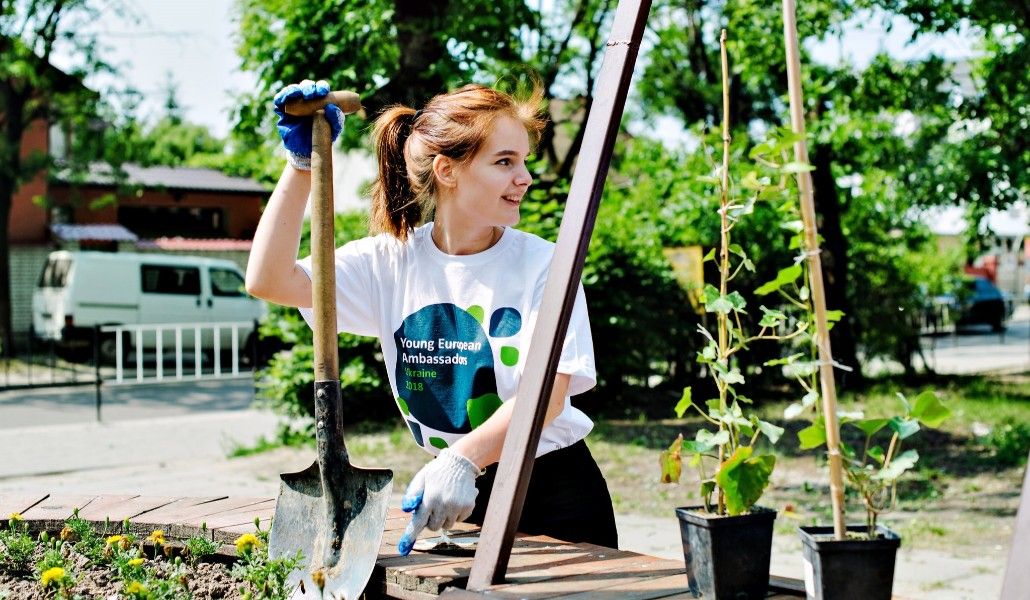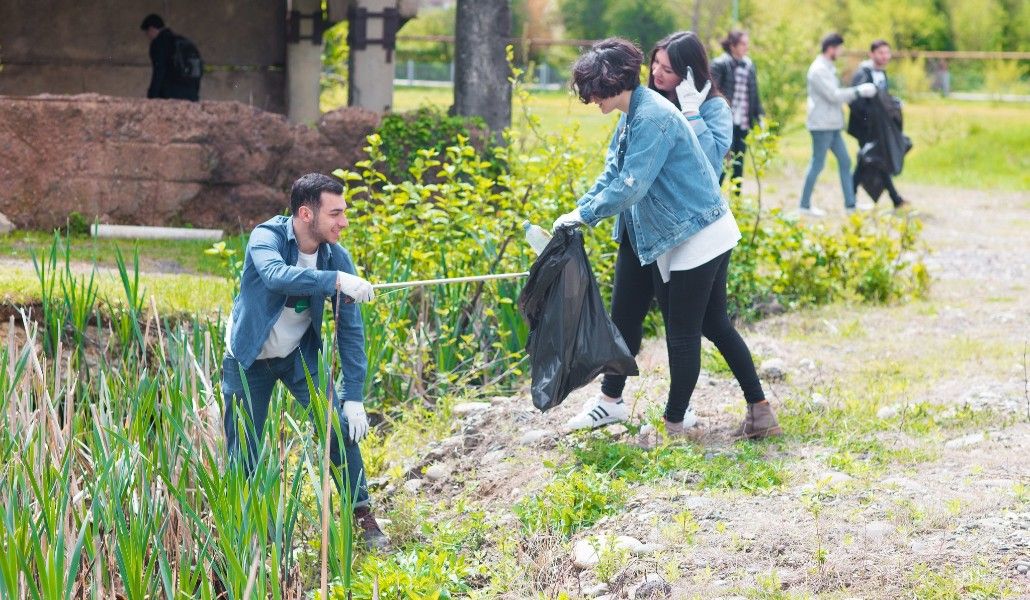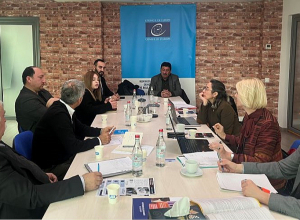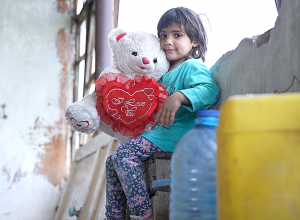Why the environment matters and how the EU helps the Eastern partner countries to protect it
Support A1+!Why the environment matters and how the EU helps the Eastern partner countries to protect it
- Why should we care about the environment?
We depend on nature for our very existence: we eat the food which grows in its soil, drink its fresh water and breathe its clean air. Housing, clothing, technology and recreation all depend on natural resources. All human activities impact on a fragile ecological balance. Disturbing this balance affects our wellbeing and prosperity.
The next ten years are decisive in making our societies more resilient in the context of major climate and environmental challenges. Together we have to overcome a heavy legacy of past environmental failures, such as loss of natural habitats and biodiversity, erosion of the soil, illegal logging, poor air quality, polluted rivers, deficient waste management, and many others.
Investing into greener development will bring benefits for health, as well as new employment and economic growth opportunities. Working together on the environment and climate resilience is therefore vital.
- How can climate change impact our daily life?
The significant and accelerated climate change caused by greenhouse gases as a result of human activities is increasing and creates severe consequences for our economies and societies.
The European Union and its Eastern neighbours are witnessing extreme rainfall events and flooding, as well as fires caused by heatwaves, soil erosion, fertility and biodiversity loss, and water resource scarcity, which are affecting industry, agriculture and households.
Only recently, wildfires fanned by abnormally hot, dry and windy weather in Ukraine raged through the Chernobyl exclusion zone for over two weeks, destroying more than 11,000 hectares of forest – a stark example of the impact of climate change.
Throughout the region, the countries are facing larger consequences of both droughts (Moldova ranks as the most climate vulnerable country in Europe and its total water availability will fall below total demand within a couple of decades), and floods (Azerbaijan is one of the most flood-prone areas in the world), as well as deteriorating water quality and risks to water supply (melting glaciers in Georgia threaten the country’s water security).
Collective action against climate change will bring many benefits for the environment, for our health, and for the economy. Rethinking and shifting our development paradigm will be an opportunity for a more efficient use of natural resources, cost savings, growth and jobs.
And if you think that climate action is expensive, think of the cost of doing nothing: Georgia estimates that climate-induced hazards could mean $10-12 billion in economic losses for the country over the next 10 years – ten times more than the cost of adapting to climate change over the same time period.
- What is the Paris Agreement about?
The Paris Agreement is the first-ever legally binding global climate change commitment, adopted at the Paris climate conference in December 2015. The EU and its Member States, as well as the countries of the Eastern Partnership, are among the nearly 190 signatories.
The Agreement sets out a global framework to avoid dangerous climate change by limiting global warming to below 2°C, and pursuing efforts to limit it further to 1.5°C. It also aims to strengthen countries’ ability to deal with the impact of climate change and support them in their efforts.
The agreement stresses the need for global emissions to start coming down as soon as possible and to achieve climate neutrality in the second half of this century.
The centrepiece of the European Union’s effort to meet its targets is the European Green Deal that aims to make Europe climate neutral by 2050, making the EU’s economy sustainable by decoupling economic growth from resource use.
The Green Deal makes it clear that environmental and climate challenges require urgent action by the EU and its partner countries. The EU therefore supports its Eastern partners in their commitments under the Paris Agreement , including the implementation of national climate plans (nationally determined contributions, NDCs), the development of long-term low greenhouse gas emission development strategies (LEDS), as well as the modernisation of their economies by moving towards climate neutrality.
Meeting these commitments will require a transition to a low carbon, resource-efficient economy, which means a fundamental shift in technology, energy, economics, finance and ultimately society as a whole.
- How does the EU contribute towards protecting the environment in the six Eastern partner countries?
EU support to the Eastern partner countries has been increasing lately. A quarter of grants provided through the Neighbourhood Investment Platform (NIP) in 2018-2019 went to ‘green’ investments. EU blending contributions to such investments increased by more than 50% between 2014-15 and 2018-19, from approximately €67 million to €107 million. In 2018-19 alone, NIP grants unlocked €1.3 billion in overall green investments in the region.
The EU has also contributed €60 million to implement regional programmes that help to improve policies and institutions in the Eastern Partnership in line with the European Green Deal. Support for municipalities amounts to some €24 million, while the partner countries also receive support through the TAIEX and Twinning programmes.
EU-funded regional programmes include :
EU4Environment (€19.5 million in EU funding) aims at helping the Eastern partner countries to preserve their natural capital and increase people’s well-being. The programme supports policy and legislative changes, makes planning and investment greener, stimulates innovative technologies and the adoption of new business models, as well as the creation of green jobs. It also promotes better environmental governance, improved management of protected areas and forests, and sustainable trade.
EU4Climate (€8 million in EU funding) is designed to support the implementation of the Paris Climate Agreement and to improve climate policies and legislation, contributing to climate change mitigation and adaptation, and development towards a low-emissions and climate-resilient economy.
The EU Water Initiative for the Eastern Partnership (EUWI+ 4 EaP – €23.5 million in EU funding) helps partner countries bring their legislation closer to EU policy in the field of water management, developing tools to improve the quality of water and its availability for all.
Environment is also high on the priorities at country level, with actions focusing on areas such as air quality, water management and marine pollution, energy efficiency, waste management, tackling pesticides and industrial pollution, and sustainable forest management.
In addition, to the European Union’s cooperation programmes, European Financial Institutions such as the European Bank for Reconstruction and Development (EBRD) and the European Investment Bank (EIB) provide significant support for transition to the green economy by supporting low carbon and climate resilient growth, as well as investing in green infrastructures. The Eastern Europe Environment and Energy Efficiency Partnership (E5P) – a multi-donor trust fund of which the EU is the major donor – facilitates investments for municipal projects that improve energy efficiency and environmental protection. The EU-funded Municipal Project Support Facility (MPSF) provides technical assistance for the preparation of energy efficiency projects that can later be implemented through loans. The EU also significantly contributes to the Green for Growth Fund (GGF).
- What do these programmes actually do? Are there any success stories?
Certainly, beyond the stated objectives and the headline budget figures lie some real success stories, protecting the environment, acting on climate change and promoting resilience and sustainability on the ground.
For example, EU is helping to enable modern water policy at basin level for a vast territory covering 500,000 km², setting a clear path towards cleaner water for more than 30 million people in the six Eastern partner countries.
With the EU’s support, Belarus, Moldova and Georgia launched the development of national green economy strategies. Ukraine is already in the top 20 countries in the world for organics farming, exporting €59 million worth of organic products in 2016, the majority certified to EU standards.
More than 100 pilot SMEs in the region received EU support to carry out resource efficiency and cleaner production programmes, resulting in savings of €9.4 million (with an average of between €2,000 and €20,000 saved per enterprise, reaching up to €100,000 in some cases). Activities continue with the support of the EU4Environment programme.
Environmental data is being aligned with EU and best international practice in all six partner countries, with data being available via an Internet-based tracking tool hosted by the European Environment Agency (EEA).
To protect and connect natural areas and biodiversity, the six Eastern partners have identified nearly 700 Emerald Network sites with an area of 12.8 million hectares, more than four times the size of Belgium.
EU support actions reach every level of society, from government policy all the way to raising awareness among primary school children, as you can see from the examples below:
In Armenia, the Connecting Nature project supports the search for new, environmentally friendly ideas and solutions to environmental problems in Yerevan – for instance, to determine the types of plants and trees that are most suitable for a given environmental situation for different areas of the city.
In Azerbaijan, EU experts from Finland, Austria and Latvia trained more than 200 employees of the Ministry of Ecology and Natural Resources to monitor air quality; the Twinning project developed a detailed plan to modernise air quality monitoring systems, including the acquisition of 25 new air quality stations.
In Belarus, schoolchildren have been taking part in a cross-border river cleanliness project on the Styr River that runs between Belarus and Ukraine, testing water quality and learning to detect nitrates, phosphates, and organic pollutants.
In the Batumi region of Georgia, a €6.1 million project has ensured the rehabilitation of the water supply and sewage systems, as well as the construction of waste treatment plants, leading to uninterrupted clean water for the population, and reduced marine pollution.
In Moldova, the burning of agricultural waste used to be a source of environmental pollution. Now, with EU support, the waste is in great demand to produce biofuel, which is used to heat 206 schools, kindergartens and public institutions.
In Ukraine, more than 7,000 people took part in the 2019 #EUBeachCleanup challenge with 234 clean-ups in every oblast in the country, as part of International Clean Beach Day, when citizens around the world gather to clean river banks and beaches. More than 35.7 tonnes of waste were collected and removed to prevent them from polluting the waters.
And across the region, officials from all countries received guidance on the environmental management of plastic waste, marine plastic litter and energy recovery from plastic waste during a TAIEX workshop on EU plastics strategy and single use plastic.
Investment in green infrastructure is also very significant, with the support of the EBRD, the EIB and the E5P alongside other investment partners. In Ukraine, this has enabled investment in clean public transport, with new trolleybus fleets in Kherson, Mariupol and Lviv, as well as €35 million in support for waste management in Lviv. In Moldova, residents of Balti, have benefited from EBRD investment in energy efficient heating and new electric buses. In the Armenian capital Yerevan, EIB funding has contributed to the upgrade of the metro and improving energy efficiency in public buildings such as kindergartens. In Azerbaijan, the EBRD has provided financing for the purchase of 35 new eco-efficient buses, leading to an annual reduction of 2,853 tonnes of CO2. In Belarus, 300,000 people are benefiting from improved water quality thanks to an EBRD loan and an E5P grant for wastewater treatment facilities in seven municipalities. In Georgia, the EIB provided a long-term loan to Tbilisi’s water utility company to support its water and wastewater infrastructure development programme, while the EBRD is to invest €75 million in the modernisation of Tbilisi metro.
- How can I become more environment-friendly?
As a citizen, you have the right, the capacity and the duty to take action for the environment.
Your everyday life choices as a voter and a consumer have the power to drive change in government policies, as well as companies’ decisions and innovations.
Consider the environmental footprint of all your purchases and reduce them, choose local products, avoid polluting substances and single-use plastic, reuse, recycle, separate, compact and dispose of waste correctly.
Adopt simple energy saving habits such as switching off lights and appliances, and closing and opening windows and shutters to keep ideal room temperature.
To save water, take a shower instead of bath, and keep it short. Don’t leave taps running, and look out for any leaks (a leaking toilet can waste 200 litres of water per day). Water your plants in the late evening or early morning, when less water is lost through evaporation.
Share your vehicle, unused objects or excess food with other people in your community, and opt for more sustainable transport and energy from renewable sources.
If you can, keep your own fruit and vegetable garden (you can even use pots on a balcony or urban orchards), eat less meat and prefer plant-based meals, buy more diverse and less processed food, and bring your own bags and containers when shopping.
Check out the EU’s climate tips for easy environmental advice for home, work, shopping and transport.





